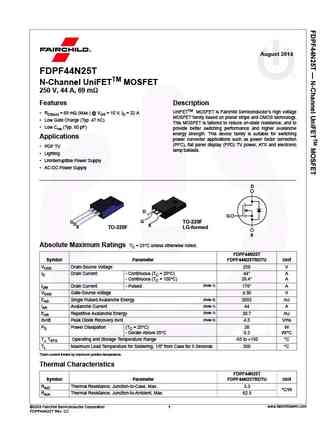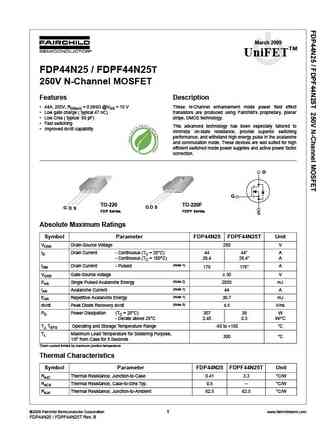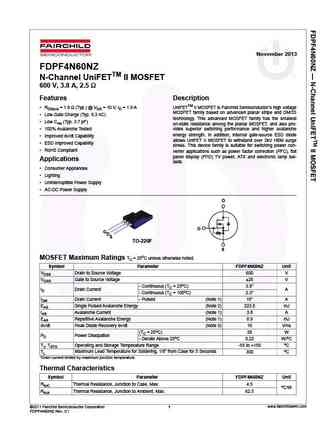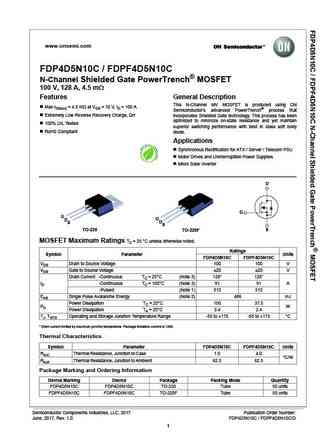FDPF44N25TRDTU Specs and Replacement
Type Designator: FDPF44N25TRDTU
Type of Transistor: MOSFET
Type of Control Channel: N-Channel
Absolute Maximum Ratings
Pd ⓘ - Maximum Power Dissipation: 38 W
|Vds|ⓘ - Maximum Drain-Source Voltage: 250 V
|Vgs|ⓘ - Maximum Gate-Source Voltage: 30 V
|Id| ⓘ - Maximum Drain Current: 44 A
Tj ⓘ - Maximum Junction Temperature: 150 °C
Electrical Characteristics
tr ⓘ - Rise Time: 402 nS
Cossⓘ - Output Capacitance: 450 pF
RDSonⓘ - Maximum Drain-Source On-State Resistance: 0.069 Ohm
Package: TO220F
FDPF44N25TRDTU substitution
- MOSFET ⓘ Cross-Reference Search
FDPF44N25TRDTU datasheet
fdpf44n25trdtu.pdf
August 2014 FDPF44N25T N-Channel UniFETTM MOSFET 250 V, 44 A, 69 m Features Description UniFETTM MOSFET is Fairchild Semiconductor s high voltage RDS(on) = 69 m (Max.) @ VGS = 10 V, ID = 22 A MOSFET family based on planar stripe and DMOS technology. Low Gate Charge (Typ. 47 nC) This MOSFET is tailored to reduce on-state resistance, and to Low Crss (Typ. 60 pF) provi... See More ⇒
fdpf44n25t.pdf
March 2009 TM UniFET FDP44N25 / FDPF44N25T 250V N-Channel MOSFET Features Description 44A, 250V, RDS(on) = 0.069 @VGS = 10 V These N-Channel enhancement mode power field effect Low gate charge ( typical 47 nC) transistors are produced using Fairchild s proprietary, planar Low Crss ( typical 60 pF) stripe, DMOS technology. Fast switching This advanced technology ... See More ⇒
fdpf44n25t.pdf
Is Now Part of To learn more about ON Semiconductor, please visit our website at www.onsemi.com Please note As part of the Fairchild Semiconductor integration, some of the Fairchild orderable part numbers will need to change in order to meet ON Semiconductor s system requirements. Since the ON Semiconductor product management systems do not have the ability to manage part nomenclatur... See More ⇒
fdpf4n60nz.pdf
November 2013 FDPF4N60NZ N-Channel UniFETTM II MOSFET 600 V, 3.8 A, 2.5 Features Description RDS(on) = 1.9 (Typ.) @ VGS = 10 V, ID = 1.9 A UniFETTM II MOSFET is Fairchild Semiconductor s high voltage MOSFET family based on advanced planar stripe and DMOS Low Gate Charge (Typ. 8.3 nC) technology. This advanced MOSFET family has the smallest Low Crss (Typ. 3.7 pF) on... See More ⇒
Detailed specifications: FCH170N60 , FDN86265P , FCH077N65F , FCH190N65F , FDB86363F085 , FCH104N60 , FCP104N60 , FDPF39N20TLDTU , 2N7002 , FDPF51N25RDTU , FQPF5P20RDTU , FDP86363F085 , FCPF850N80Z , FCP150N65F , FCPF1300N80Z , FDA16N50LDTU , FDPF33N25TRDTU .
History: 2N5246
Keywords - FDPF44N25TRDTU MOSFET specs
FDPF44N25TRDTU cross reference
FDPF44N25TRDTU equivalent finder
FDPF44N25TRDTU pdf lookup
FDPF44N25TRDTU substitution
FDPF44N25TRDTU replacement
Learn how to find the right MOSFET substitute. A guide to cross-reference, check specs and replace MOSFETs in your circuits.
History: 2N5246
🌐 : EN ES РУ
LIST
Last Update
MOSFET: ASB80R750E | ASB70R380E | ASB65R300E | ASB65R220E | ASB65R120EFD | ASB60R150E | ASA80R900E | ASA80R750E | ASA80R290E | ASA70R950E
Popular searches
ftp08n06a | 2n3405 | 2n3567 | 2sc1226 | 2sd180 | 2sd235 | k3502 datasheet | p0903bdg datasheet






